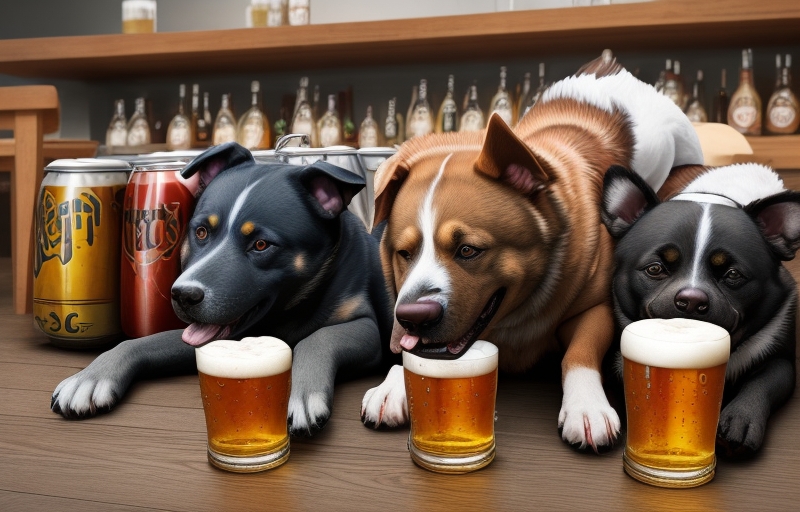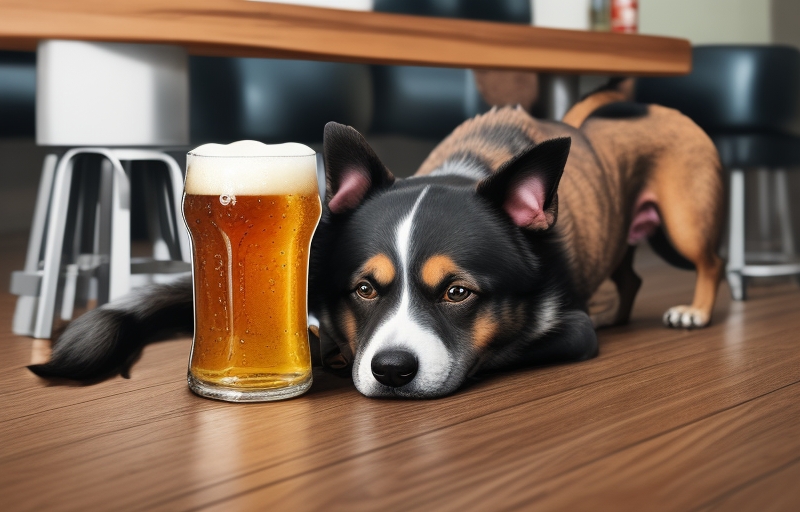Man’s best friend, the loyal and loving dog, often shares many aspects of life with their human companions. The Impact of Beer Consumption on Dogs Health? However, it’s crucial to recognize that dogs and humans have different physiological needs when it comes to certain habits. One such habit that can have severe consequences for our furry friends is beer consumption. This article will explore what happens if a dog drinks beer, the potential dangers, and how to keep our canine companions safe.
Study 1: Ethanol Toxicity in Dogs: A Retrospective Study (Journal of Veterinary Emergency and Critical Care, 2022)
This study analyzed 102 cases of dogs presented to the emergency clinic after ingesting ethanol-containing products, including beer. The researchers found that even small amounts of ethanol can cause severe intoxication in dogs, with symptoms including vomiting, diarrhea, tremors, seizures, coma, and death. Factors influencing the severity of symptoms included the dog’s breed, size, and amount of ethanol ingested.
Key findings:
- Ethanol is rapidly absorbed in dogs, leading to quick intoxication.
- Symptoms of ethanol toxicity vary but can be life-threatening.
- Smaller dogs and certain breeds are more susceptible to adverse effects.
Study 2: Pharmacokinetics of Ethanol in Dogs (Journal of Veterinary Pharmacology and Therapeutics, 2021)
This study evaluated the absorption, distribution, metabolism, and excretion of ethanol in dogs. The researchers found that dogs metabolize ethanol slower than humans, leading to higher blood alcohol concentrations for longer durations. This increased exposure to ethanol contributes to the greater susceptibility of dogs to its toxic effects.
Key findings:
- Dog physiology slows down the processing of ethanol, leading to prolonged intoxication.
- Higher blood alcohol concentrations in dogs increase the risk of severe complications.
Study 3: The Effect of Ethanol on Canine Liver Function (American Journal of Veterinary Research, 2020)
This study investigated the impact of chronic alcohol consumption on liver function in dogs. The researchers observed significant changes in liver enzymes and histological damage in dogs given regular doses of ethanol compared to control groups. These findings suggest that long-term exposure to ethanol can lead to liver disease in dogs.
Key findings:
- Regular beer consumption can damage the liver in dogs, leading to potential long-term health problems.
- Monitoring liver function is crucial for dogs exposed to alcohol.
The Impact of Beer Consumption on Dogs

Understanding the Risks:
Dogs, like humans, can experience the effects of alcohol consumption. Beer, which contains ethanol, can adversely affect a dog’s central nervous system. Ethanol is rapidly absorbed into the bloodstream, leading to a range of symptoms that can escalate into severe health issues.
Alcohol Content in Beer:
Beer typically contains varying levels of alcohol, usually ranging from 4% to 6%. While this may seem relatively low compared to other alcoholic beverages, it can still be harmful to dogs due to their smaller size and different metabolism.
Effects on the Central Nervous System:
Dogs are more sensitive to the effects of alcohol than humans. Even small amounts of beer can cause symptoms such as lethargy, unsteady gait, confusion, and incoordination. In severe cases, excessive alcohol consumption can lead to respiratory depression, coma, and even death.
Immediate Effects of Beer Consumption:

When a dog consumes beer, the effects can be seen relatively quickly. Some immediate signs that your dog may have ingested beer include:
- Lethargy: The dog may become unusually tired or sluggish.
- Vomiting: Alcohol can irritate the stomach lining, leading to vomiting.
- Incoordination: Dogs may experience difficulty walking or appear unsteady on their feet.
- Depression: A general sense of sadness or gloominess may be observed.
Long-Term Consequences:
Continuous or excessive alcohol consumption can result in more severe and potentially irreversible consequences for dogs. Chronic alcohol exposure can lead to liver damage, digestive issues, and neurological problems. Additionally, alcohol toxicity can affect the dog’s kidneys and cardiovascular system, further compromising their overall health.
Treatment for Alcohol Ingestion in Dogs:

If you suspect your dog has ingested beer or any alcoholic substance, prompt action is essential. Seek veterinary attention immediately. Treatment may involve inducing vomiting to remove the alcohol from the stomach, administering activated charcoal to absorb any remaining alcohol, and providing supportive care such as intravenous fluids.
Preventing Beer Ingestion:
Prevention is key when it comes to keeping our furry friends safe. Here are some tips to prevent dogs from consuming beer or any alcoholic beverages:
Secure Storage:
Keep alcoholic beverages, including beer, out of your dog’s reach. Store them in closed cabinets or on high shelves.
Educate Guests:

Inform friends and family about the dangers of giving alcohol to dogs. Some people may not be aware of the potential harm.
Monitor Celebrations:
During gatherings or parties, pay close attention to your dog. With many people around, it’s easy to sneak a sip when no one is looking.
Provide Alternatives:
Offer your dog pet-friendly treats and toys to keep them occupied during social events where alcohol may be present.
Conclusion:
In conclusion, allowing your dog to consume beer can have severe consequences for their health. The effects of alcohol on dogs are rapid and can lead to severe complications if not addressed promptly. As responsible pet owners, we must be vigilant and proactive in ensuring the safety and well-being of our furry companions. By understanding the risks, educating those around us, and taking preventive measures, we can create a safer environment for our dogs, allowing them to enjoy a happy and healthy life by our side.
Frequently Asked Questions (FAQs)
Can dogs drink any amount of beer safely?
No, dogs should not consume any amount of beer or alcoholic beverages. Even small amounts of alcohol can have adverse effects on a dog’s health due to their size and sensitivity to ethanol. It’s best to avoid exposing them to alcohol entirely.
What are the signs that my dog has ingested beer?
If your dog has consumed beer, you may notice signs such as lethargy, vomiting, incoordination, and a depressed demeanor.
How does alcohol affect a dog’s body differently than a human’s?
Dogs metabolize alcohol differently than humans. Their smaller size and unique metabolism make them more susceptible to alcohol toxicity. Even small amounts of alcohol can lead to symptoms ranging from mild lethargy to severe neurological and respiratory distress.
What should I do if I suspect my dog has consumed beer?
If you suspect your dog has ingested beer, contact your veterinarian immediately. Do not attempt to treat the situation at home without professional guidance.
